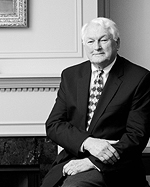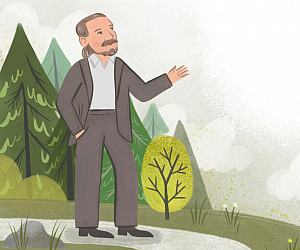Bragdon Tapped as Interim President
Paul Bragdon, a legend in Oregon’s higher education circles, leads Lewis & Clark through transition. Also: The college’s “perfect storm,” a new chief financial officer, presidential search update, and the Pamplin family donation of $6.5 million.

When Paul E. Bragdon resigned the Reed College presidency after 17 years in 1988, the editor of Reed Magazine wrote, “No one could ask for a more judicious, deliberative, and caring president. But he also has a positive affinity for the unexpected: he has made a career, and continues to do so, by deciding to put himself in the way of surprises.”
Perhaps one of the biggest surprises of his career was becoming interim president of Lewis & Clark College in the summer of 2003. (“It’s the last thing I ever would have thought would happen,” he says.) But no one could have foretold the circumstances surrounding his appointment either—an unsecured loan gone bad, a longtime president resigning amid intense media coverage, and the College’s internal and external constituents left wondering what had happened.
Enter Paul Bragdon, a man whose reputation looms large in Oregon’s higher education circles, a man who was once named one of the 100 most successful college presidents in the country, a man who leads Lewis & Clark during this important period of transition.
Q: How were you approached for this position?
A: When Michael Mooney’s departure plans became public knowledge, several people suggested to me—some of them facetiously, I think—that I should help Lewis & Clark through this period by serving as its president. I did not take this idea seriously—in fact, I tended to chuckle about it.
But then a number of people associated with Lewis & Clark (not trustees) mentioned it to me. Not long after that, Fred Fields, chair of the Board of Trustees, called on me. We discussed the possibilities. Thereafter, I consulted several longtime friends at the College to see if they would be supportive of this move. When each of them in turn said yes, I gave the idea serious consideration and agreed to come here.
Q: How did your family react?
A: Nancy, my wife, thought it was a good idea. That was quiteimportant.
Q: What cemented your decision to come to Lewis & Clark?
A: Like many others, I’ve been impressed with the development and quality of the institution. In my opinion, it’s stronger than it’s been at any point in its history. I thought it important that the College continue on the course of becoming ever stronger, ever better. It’s my conviction that this is an institution worthy of support. Last summer’s unfortunate events did not affect the College’s basic underpinnings or its strength as an educational institution.
Q: How do you view your role as interim president?
A: It was important to me that I was the interim president and not the acting president. Maybe to some people there isn’t a difference. But to me, an acting president assumes only parts of the role; an interim president is a president like any other—except his or her term is confined to a particular period of time. As interim, I am not interested in making decisions that will unduly bind a new president. Rather, I want to do everything I can to keep the institution moving forward.
Q: What steps are being taken to prepare the College for a new president?
A: In terms of its history, Lewis & Clark is at the end of a fairly recent fund-raising campaign, the end of a 14-year presidency, and near the end of a 7-year program of capital construction. We’re at a point, then, where it makes sense to do some strategic planning for the institution—what are its priorities, where would it like to go over the next several years. I don’t think I should be the key figure in that process, but I think I can play a significant role in laying the groundwork for it.
During my term as interim, I want to give all constituents of the College—faculty, staff, and students; the Board of Trustees; alumni and other interested parties—a sense of the current environment in higher education and Lewis & Clark’s place within it. There are issues common to all colleges and universities at this time. We also need to outline the College’s particular strengths and the issues it must confront. I think it’s a significant period to prepare Lewis & Clark for the next steps in its development.
Q: How would you describe the current higher education environment?
A: I think we all understand that we’ve left an era that was most unusual in our history: the period of the great economic boom of the late 1990s. I think that this period could be described as the second golden age for higher education. The first would have been the great growth period after World War II until about 1964 or 1965.
In this new era, it’s going to be more difficult to gain resources, and we have to give much more thought to the use and allocation of those resources. We have the advantage that higher education is prized and people do see its importance. On the other hand, we have real issues of cost and access at a time when need-based financial aid is declining. In spite of demand for advanced education, there is nevertheless a keen competition for the students we would like to have. And it’s an uneven competition. Some institutions have great resources through endowment and can more easily provide financial aid. Plus, there is the major issue of tuition discounting, which refers to lowering the cost of tuition by offering significant financial aid packages to qualified students. This issue, in particular, threatens independent colleges and has to be managed very carefully both here and everywhere else.
Q: What are the unique strengths of Lewis & Clark?
A: The most important thing is that we have very good faculty and very good students at all three schools, and that is the heart of the enterprise. I think it’s clear that we offer a beautiful environment in which the educational experience happens—there has been a great investment in it, and it will continue to serve the College well in the years ahead. Lewis & Clark’s location near Portland is favorable as well.
Q: What are the challenges facing the College?
A: I think last summer’s events involving the unpaid loan in and of themselves did not hurt the College. The loan fallout didn’t affect either the quality of what goes on here on campus or the financial strength of the College. That was a very unusual event—albeit one that caused some shock and dismay.
But the real problems of the College are different from that. We are tapping into a high percentage of our endowment to support the institution. Generally, this percentage should be in the neighborhood of 5 percent; we are closer to 6 percent—at a time when the financial markets are not supporting rapid growth in the endowment.
We also need to recognize that philanthropy is going to be more difficult. A president at one of our sister colleges in Oregon recently spoke to his constituencies about a “period of austerity.” We’re going to need to be far more resourceful and thoughtful with respect to resources and their use than we’ve become accustomed to in the recent past.
Q: What do you say to alumni and others who are still concerned about the events of last summer?
A: One can understand their anxiety, their anger, their skepticism, or their need to ask rather searching questions. I hope they’ll be patient, and that over time, they will come to think about the institution in the same way they have in the past.
Q: What advice do you plan to give to the new president?
A: I wouldn’t presume to impose my views on anybody. I believe certain things about presidencies in general, but they are quite personal. I think it’s more important to focus on what one should be looking for when meeting presidential candidates.
First, any president anywhere should be devoted to saying the same thing to each constituency of the College. The emphasis chosen and the language used might vary based on the interests of the listener, but it should be the same essential message.
Second, the College’s constituents are entitled to some straightforward statements about what the institution is and where it hopes to go—what its problems are, what its strengths are, and the plan for moving forward.
Third, you can assume that one who is or wants to be a college president is an ambitious person. I think we should be looking for someone who will tie that ambition to this institution—someone who understands that personal ambition is achieved by aligning it with institutional interests.
Overall, the president serves an educational role, but not in the classroom. It’s necessary to enlist the support and cooperation of a lot of people to get things done over a long period of time, which means a lot of consultation, a lot of testing of ideas, and a lot of listening.
L&C Magazine is located in McAfee on the Undergraduate Campus.
MSC: 19
email magazine@lclark.edu
voice 503-768-7970
fax 503-768-7969
The L&C Magazine staff welcomes letters and emails from readers about topics covered in the magazine. Correspondence must include your name and location and may be edited.
L&C Magazine
Lewis & Clark
615 S. Palatine Hill Road
Portland OR 97219
More Stories

Fighting for Our Forests
As the planet warms, L&C community members defend forest health through research, policy, and frontline forest work.

Hired and Inspired
On social media, we asked: What was your most memorable campus job?”

First-Class Scholars
Lewis & Clark’s inaugural cohort of Posse Scholars graduates this spring, celebrating their success as student leaders and their readiness to create change beyond campus.

A Path with Purpose
For nearly two decades, Scott Fletcher, dean of the graduate school, has championed social justice and expanded the school’s impact, supporting faculty, staff, and students in service to the community.